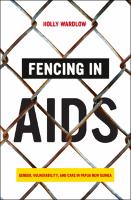Fencing in AIDS
Gender, Vulnerability, and Care in Papua New Guinea
Abstract
In this vitally important book, medical anthropologist Holly Wardlow takes readers through a ten-year history of the AIDS epidemic in Tari, Papua New Guinea, focusing on the political and economic factors that make women vulnerable to HIV and on their experiences with antiretroviral therapy. Alive with the women’s stories about being trafficked to gold mines, resisting polygynous marriages, and struggling to be perceived as morally upright, Fencing in AIDS demonstrates that being female shapes every aspect of the AIDS epidemic. Offering crucial insights into the anthropologies of mining, ethics, and gender, this is essential reading for scholars and professionals addressing the global AIDS crisis today.;“This inspiring book sets the stage for the arrival of the AIDS epidemic in Tari. With the collapse of the state, some women turn to transactional sex for school fees and basic goods. A chorus of women tell stories of rape and abandonment and of their resilience in adopting forms of self-care that include protection for others.” SHIRLEY LINDENBAUM, author of Kuru Sorcery: Disease and Danger in the New Guinea Highlands;“Fencing in AIDS is a superb book that creates a consummate connection between an intimate ethnography of gender, sexuality, and HIV amongst Huli people in Papua New Guinea and the structural contours of the economy and politics in that country, engaging the global literature on sex, love, HIV, the state, extractive industries, and moral philosophy.” MARGARET JOLLY, Professor in the School of Culture, History & Language, Australian National University
Keywords
AnthropologyDOI
10.1525/luminos.94Publisher
University of California PressPublisher website
https://www.ucpress.edu/Publication date and place
Oakland, 2020Classification
Anthropology


 Download
Download